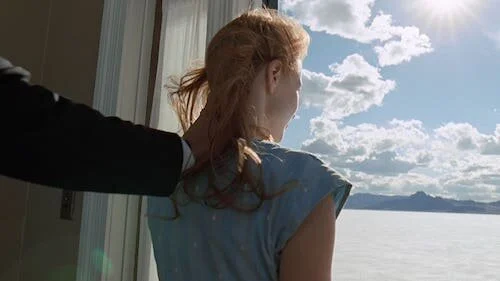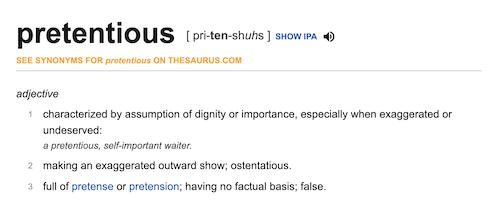Why The Word "Pretentious" Barely Belongs In Film Criticism
Todays’s think piece is going to be short and sweet. I think the buzzword “pretentious” is a load of nonsense that gets misused tremendously, and takes away from the actual effort of artists that opinionated people don’t generally like. It’s a pet peeve of mine that has festered year after year. It’s a go-to label for people when they don’t like something and they may find the end result in their face (likely due to their dislike for said piece). Does that make art pretentious? Are we not tossing this word around a little bit? Here’s why I think we are, and why “pretentious” is on route to being as bastardized as “ironic” or “literally”.
First off, let’s have a dictionary definition for pretentious.
www.dictionary.com
So one form of this word describes the inauthenticity of one’s claims (3), and the other is an attention-grabbing attempt (2), which could be used in film criticism or opinion pieces. I’m focusing more on that first definition, where people claim a film, film maker, performer, or whomever else isn’t deserving of praise because they are “pretentious”. Here’s what I’d like to know: why are they pretentious?
Here’s my argument (and this is even in favour of filmmakers of whom I generally don’t like at all): who the hell wouldn’t try to make a good film?
I’ve seen this word tossed at works like The Tree of Life or Inception or Stanley Kubrick films, and et cetera (the list is forever growing). If given the chance to make a film, would you not aim to make the best product you could in your own way? This may mean long shots of visual aesthetics, interesting narrative webbing, or preference of photography over story (like the above examples), or whatever other means one may have. If you think a particular part of a film is lacking, then that’s what you say. A film that looks great but is narratively inept is not pretentious.
Now, here’s another argument. Suppose you’re dealing with a terrible script, or a star you can’t work with, or some other huge problem that is making your shoot difficult. The film is pretentious, right? Trying to make out that it’s better than it is. I’d still say no. Why aren’t casts and crews trying to overcome obstacles or improve films in ways when they are lacking in certain areas? Why does a strength in one area and a weakness in another represent filmmaking that values itself as worthless and pretends it isn’t? There are three main stages of filmmaking: the pre-production (writing, story boarding, casting), the production (shooting related aspects) and the post production (editing, sound, CGI). A film transforms in each and every stage, and is far from how it was initially conceived in the early stages, and it doesn’t matter how hands-on a director or producer(s) is with their work; it will never be exactly as one imagines when in the earliest stages. With that in mind, how many people can be aware the entire time of what they have?
You can have a clear-cut disaster from the get go (The Emoji Movie, anyone?), but even then, there are hundreds of people at work here, who are trying to keep their jobs no matter what their next assignment is. People rely on their careers to survive, and not everyone has the luxury of being picky. Besides, who isn’t going to work as hard as they can if their jobs depend on it? Who wants to be known as the reason why something failed? Cats was lambasted for its effects (amongst other things), and the artists have spoken out to clear their name. This is exactly what I’m talking about. Plus, let’s assume a miracle happens, and The Emoji Movie was leagues better than expected. You’re part of the team that made the impossible happen. Why? Because you worked hard. Wouldn’t that be something to be proud of?
With hundreds of different people working on a film (we can assume most or all of these people are trying their best), and a few biggies that are overseeing this work (director, producers), there are countless moving parts to be in charge of, in three different stages (and their many micro stages) for an undetermined amount of time (even with a schedule, shoots can run over or under). One of two things can happen in regards to a terrible film being made (unless it is absolutely obvious from the very beginning, and the film is being made for the wrong reasons). One, it is very hard to detect exactly how a film will end up at any point outside of the ending stretch. Two, problems can be detected and everyone will try their best to fix what they can. Does any of this make the teamwork or executive decisions pretentious? I’d say ignorant or naive in the worst cases, and capable-of-oversights or optimistic in the best, but not pretentious.
At the end of the day, I think it’s insulting to insist that an artist doesn’t care about their work but wants us to care. This has definitely happened in the past, but you can’t claim that every film with a pinch of effort that you don’t like is pretentious. I’d much rather have a film I don’t like where everyone clearly tried, than a lazy product that is a complete waste of time. I’m not a fan of James Cameron, but I wouldn’t dare call him pretentious for his ambitious ways of putting together his films. Besides, art is subjective, and most films will have fans (even if you can’t believe it). What you’re trying to label is a film that didn’t speak to you. Maybe you feel excluded from the masses. That doesn’t make a film pretentious. Maybe it’s overhyped, though. Maybe you don’t like a film trying to impress you when you’re not impressed. You can admit you don’t like the film, fair and square.
At the end of the day, I know there have been pretentious films in all of cinema, but I’m going on record to insist that most films labeled as such aren’t pretentious, and it’s a feeble attempt to describe something one doesn’t like. Whether you like it or not, most directors, casts, and crew put work into what they make. Maybe you should put work into how you describe your feeling for it. Positive or negative, these artists at least deserve that.
Andreas Babiolakis has a Masters degree in Film and Photography Preservation and Collections Management from Ryerson University, as well as a Bachelors degree in Cinema Studies from York University. His favourite times of year are the Criterion Collection flash sales and the annual Toronto International Film Festival.




